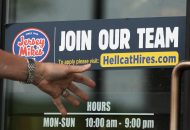Would You Rather Burn Dollar Bills or Permit and Even Encourage Stock Buybacks? A Tax on Buybacks Is Not Grounded in Basic Corporate Finance
COMMENTARY

From guns to masks and more, too many issues today have become politicized and are not addressed based on dispassionate facts and common sense. The current tax on stock buybacks and the talk of quadrupling it is yet another such issue — although certainly not one that is about life and death. But it is misguided and reflects a lack of understanding of simple corporate finance.
As part of the Inflation Reduction Act passed by Congress and signed into law by President Biden late last year, there is generally a 1% tax on the dollar amount of stock bought back by publicly traded companies. Now, there is talk of increasing this tax to 4%.
Some have argued that this tax helps to reduce a glitch in the tax system where dividends are taxable for many shareholders, but stock buybacks were typically not a taxable event for companies or shareholders (who do not sell their shares). On the other hand, the Business Roundtable has said that this tax will discourage investment and growth.
But much of the fuel for this part of the Inflation Reduction Act came from some loud voices claiming that, if companies did not use capital to buy back stock, they would use that liquidity to invest in their people and communities. For example, Sens. Ron Wyden, D-Ore., and Sherrod Brown, D-Ohio, introduced the Stock Buyback Accountability Act in September 2021. Wyden said, “Rather than investing in their workers, mega-corporations used the windfall from Republicans’ 2017 tax cuts to juice their stock prices and reward their wealthiest investors and their executives through massive stock buybacks.” Brown added that “instead of spending billions buying back stocks and handing out CEO bonuses, it’s past time Wall Street paid its fair share and reinvested more of that capital into the workers and communities who make those profits possible.”
A basic tenant of corporate finance is that a company should invest only if a given project has a return in excess of its weighted average cost of capital or WACC. This calculation is the blended cost of equity (typically calculated with the well known Capital Asset Pricing Model) and, for tax payers, the after tax cost of debt. Assume that a company has a 10% WACC. If a company invests in a project with an 8% expected return, it will not realize its cost of capital and is figuratively and almost literally “burning dollar bills.”
It is certainly not the case that well-governed and well-managed companies approve investments below their cost of capital. It is very much the case that well-governed and well-managed companies seek to maximize long-term shareholder value. Therefore, stock should be bought back with excess capital if such efforts are expected to increase earnings per share with acceptable pro forma leverage.
And it is simplistic and just wrong that, if companies with excess cash and debt capacity do not buy back stock, they will invest those monies in workers and communities. First, there are numerous companies that have bought back substantial stock and made major investments in their most valuable assets, employees and their communities. In addition, if a company has excess capital, does not buy back stock and believes that it has invested sufficiently in human capital and communities, it can simply keep that cash on its balance sheet or reduce debt.
Politicized decisions not based on dispassionate analysis are suspect. Much of the rationale for the tax on stock buybacks is just incorrect, and a tax on stock buybacks shows a lack of understanding of basic corporate finance.
Jonathan F. Foster is the founder and a managing director of Current Capital Partners LLC, a mergers and acquisitions advisory, corporate management services and private equity investment firm. Jon has over 30 years of experience as an advisor focused largely on industrial and services companies. He has also been on the boards of 40 companies. In addition, as an expert witness in major corporate litigation, Jon has filed numerous reports, as well as been deposed many times and testified in court about mergers and acquisitions, valuation and governance issues. You can reach Jon by email or on LinkedIn.























